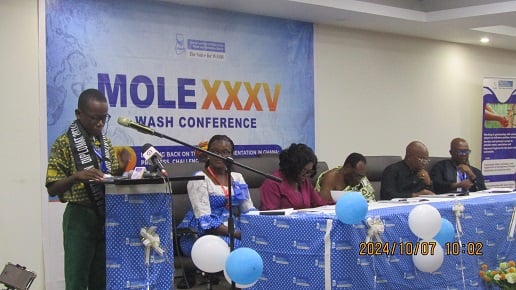On Monday, the Child Sanitation Diplomat, Master Abdul Yazid Faraj Timtoni Wumbei, expressed his praise for the initiators and organizers of the School Sanitation Solutions Challenge. The platform provides children with the opportunity to voice their thoughts, learn, and share innovative ideas regarding sanitation. During his address at the opening ceremony of the MOLEXXXV conference held in Ho, Volta Region, Master Wumbei recognized World Vision Ghana and Kings Hall Media as key originators of the esteemed TRIPLE S competition. He also acknowledged the contribution of several organizations, including the Zoomlion Foundation, GAMA Sanitation and Water Project, Ghana Education Service, and the Ministry of Sanitation and Water Resources, whose technical and financial backing was integral to the project’s success. As a pupil of Grace Holy Child Academy in Tamale, Northern Region, Wumbei celebrated the platform as a valuable opportunity for Ghanaian children to actively participate in sanitation advocacy.
Master Wumbei paid tribute to his predecessors as Child Sanitation Diplomats, including Neriah Nettey and Naziru Mawadatu, noting that their efforts laid a solid foundation for encouraging Ghanaian youth to engage in sanitation issues. Furthermore, he expressed gratitude to the Coalition of NGOs in the Water and Sanitation Sector (CONIWAS) for facilitating his participation in the MOLE WASH Conference. He also acknowledged Mr. Bruce Dominic Welaga, the academy’s manager, for accompanying him on his journey from Tamale to Ho, highlighting the collaborative spirit and dedication that enveloped the event. His message underscored the importance of continuity in advocacy work and the necessity for future generations to remain committed to improving sanitation conditions in Ghana.
The conference hosted esteemed speakers like Ing. Harold Esseku, Senior Water and Sanitation Specialist at the World Bank Ghana, who emphasized the need for WASH services to embrace a circular economy. He insisted that integrating climate adaptation and mitigation strategies within sanitation efforts is crucial for resilience against changing environmental conditions. Esseku’s call for a mindset shift among Ghanaians toward environmental responsibility resonated as a vital component of improving sanitation services. Attention to climate considerations is increasingly necessary, given the escalating climate impacts on water and sanitation infrastructure. His remarks set the tone for a forward-looking dialogue among stakeholders about best practices and innovative solutions in sanitation.
Ms. Beata Awinpoka Akanyani, the Chairperson of CONIWAS, echoed the need for enhanced financial support for its members. She articulated the challenges faced by organizations in the water and sanitation sector and urged both the government and development partners to reassess funding structures. Akanyani’s appeal illustrated the real obstacles that NGOs encounter, hindering their effectiveness in implementing water and sanitation projects. By shedding light on these challenges, she called for collective action to bolster the capacity of organizations committed to improving sanitation and water resources in Ghana.
The opening ceremony of the MOLE Conference was led by Togbe Tepre Hodo IV, the Paramount Chief of Anfoega, underscoring the event’s significance in the local context. The gathering included key stakeholders from various sectors, including government officials, civil society representatives, and WASH experts dedicated to sharing knowledge and experiences. The theme, “Looking Back on SDG 6 Implementation in Ghana: Progress, Challenges, and Ways Forward,” highlighted the necessity to evaluate Ghana’s achievements and obstacles concerning Sustainable Development Goal 6. This multifaceted approach ensures that the conference not only celebrates progress but also addresses existing gaps in the sanitation landscape.
As the five-day MOLE35 Conference unfolded, participants engaged in discussions around four main thematic topics: institutional alignments and policies, strategies, and methods geared toward achieving SDG 6 in Ghana. This collaborative effort brought together a wide array of organizations, including IRC Ghana, World Vision Ghana, and the Ghana WASH Journalists Network, all working toward promoting effective sanitation practices. The conference served as a platform for diverse stakeholders to dissect various approaches to water and sanitation, stressing the importance of knowledge sharing and strategic partnerships to overcome challenges. The commitment to advancing sanitation and water resources reflects a broader national endeavor to ensure that Ghana meets its global obligations under SDG 6, emphasizing the importance of ongoing dialogue and collaboration in achieving these crucial goals.














